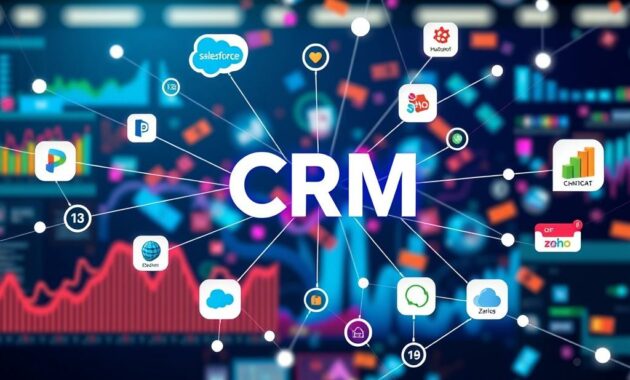Seeking to elevate your sales efficiency? The integration of NetSuite CRM with various tools and platforms can unlock your team’s full potential. This synergy streamlines processes, enhances communication, and optimizes sales. Such an approach not only amplifies productivity but also enriches customer interactions, enabling the delivery of CRM solutions that are meticulously tailored to your business’s unique requirements.
This article will unveil the numerous benefits of utilizing NetSuite CRM integrations. These benefits are specifically designed to enhance your sales capabilities and revolutionize your customer engagement strategies.
What is NetSuite CRM?
NetSuite CRM represents a comprehensive solution aimed at optimizing customer relationship management. It integrates a suite of core features designed to streamline sales processes and elevate customer engagement. By consolidating all customer interactions within a unified platform, NetSuite CRM affords a holistic perspective on the customer journey, spanning from initial contact to post-sale support.
Understanding NetSuite’s Core Features
The core features of NetSuite CRM comprise several pivotal functionalities, tailored to meet the exigencies of your enterprise:
- Contact Management: Enables the effortless storage and management of comprehensive customer and prospect information.
- Sales Automation: Automates mundane sales tasks, thereby enhancing efficiency and allowing your team to concentrate on sales activities.
- Data Analytics: Facilitates the acquisition of insights through advanced reporting tools that dissect customer data and sales metrics.
These functionalities synergize to forge a seamless experience, thereby augmenting visibility over customer interactions and service delivery.
Benefits of Using NetSuite CRM
The benefits of CRM transcend basic contact management. The adoption of NetSuite CRM catalyzes increased sales productivity, enabling your team to expedite deal closures. It also facilitates the enhancement of customer retention rates through the cultivation of personalized communications. Furthermore, the advanced reporting capabilities empower you to discern trends and make informed decisions that steer your business strategies.
Why CRM Integrations Matter
In today’s fast-paced business environment, understanding the importance of CRM integrations can significantly affect your overall success. Integrating various applications with NetSuite CRM offers tremendous advantages, particularly in streamlining business processes and enhancing customer experiences.
Streamlining Business Processes
Integrating tools and platforms with your NetSuite CRM facilitates business process improvement. This integration reduces data silos, allowing for seamless information sharing among departments. Some key benefits include:
- Automation of repetitive tasks saves time and increases productivity.
- Real-time data access enhances decision-making.
- Streamlined communication between sales, marketing, and support teams boosts overall efficiency.
Enhancing Customer Experience
With a well-integrated CRM system, you can dramatically improve customer experience optimization. Personalized service becomes more achievable, fostering loyalty and trust. Here are several ways CRM integrations contribute to enhanced customer interactions:
- Faster response times improve customer satisfaction.
- Tailored recommendations based on customer behavior drive engagement.
- Consistent communication channels create streamlined support processes.
Top NetSuite CRM Integrations to Consider
Integrating NetSuite CRM with other platforms can significantly enhance your business operations. The following integrations are among the top CRM integrations you should explore to optimize different aspects of your business.
Marketing Automation with HubSpot
HubSpot is a leading platform in marketing automation that pairs well with NetSuite CRM. This integration allows you to streamline your marketing processes, enabling efficient lead generation and nurturing. With HubSpot, you can automate email campaigns, track customer interactions, and analyze marketing performance, helping you to engage your audience effectively and increase conversions.
E-commerce Solutions with Shopify
Shopify stands out as a powerful e-commerce solution that complements your NetSuite CRM seamlessly. By integrating these platforms, you can manage your online store efficiently. This integration provides robust features such as inventory management, order tracking, and sales analytics. It enables real-time synchronization between your e-commerce site and CRM, allowing you to enhance customer experiences and boost online sales.
Customer Support with Zendesk
Zendesk is an excellent tool for managing customer support that integrates effortlessly with NetSuite CRM. With this integration, you can track customer inquiries, manage support tickets, and improve service quality. Zendesk helps agents respond more effectively, providing a holistic view of customer interactions. This leads to quicker resolutions and enhanced satisfaction for your clients, ensuring they have a positive experience with your brand.

How to Choose the Right Integration
The selection of an appropriate CRM integration necessitates a series of pivotal steps, each meticulously aligned with your overarching business objectives. The initial step involves a comprehensive understanding of your unique business requirements. This entails a rigorous business needs assessment to pinpoint existing challenges and desired outcomes. Armed with this knowledge, you can then systematically evaluate various integration options against several critical criteria.
Assessing Your Business Needs
Embark on this journey by conducting an exhaustive business needs assessment. This endeavor should encompass:
- Identifying current challenges your team faces, such as data silos or inefficient workflows.
- Determining desired outcomes, like improved customer engagement or streamlined communications.
- Consulting team members to gather insights on what features they deem essential for their daily operations.
Evaluating Integration Options
Post-understanding of your needs, pivot towards integration evaluation. Seek out options that promise:
- Compatibility with your existing systems to ensure a seamless transition.
- Scalability to accommodate future growth and evolving business requirements.
- Enhanced productivity through automation features that liberate the team from mundane tasks.
Guided by these criteria, you can select CRM integration solutions that will propel your business forward with confidence.
| Criteria | Description |
|---|---|
| Compatibility | Ability to work with existing software and systems. |
| Scalability | Potential to grow and adapt alongside your business needs. |
| Enhanced Productivity | Features designed to automate tasks and streamline workflows. |
Steps to Implement NetSuite CRM Integrations
The process of integrating CRM systems necessitates a meticulous strategy to guarantee success. Initiate by formulating an integration strategy, detailing your objectives, evaluating available resources, and establishing a timeline for implementation. This foundational phase is critical for the successful integration of CRM systems.
Planning Your Integration Strategy
Effective planning is paramount for the successful integration of CRM systems. Begin by identifying the primary business objectives that the integration aims to address. Consider the following elements:
- Goals: Define the objectives you seek to achieve through the integration.
- Resources: Assess the tools and personnel required for the integration process.
- Timeline: Establish a realistic schedule for the implementation.
By articulating these factors clearly, you can develop a comprehensive integration strategy that will guide you throughout the process.
Testing and Launching
Thorough testing of CRM systems before the official launch is crucial to prevent disruptions. This phase involves comprehensive testing procedures to assess system performance and functionality. Key testing components include:
- Functional Testing: Verify that all integrated features operate as intended.
- User Acceptance Testing: Solicit feedback from actual users to identify any concerns.
- Performance Testing: Evaluate system efficiency under various loads.
Upon successful testing, proceed to the launch phase, closely monitoring system performance to address any immediate issues. This rigorous testing approach minimizes risks, thereby enhancing the overall effectiveness of your integration.
Customizing Your NetSuite CRM Experience
Personalization is paramount in optimizing your NetSuite CRM’s efficacy. Tailoring NetSuite CRM to your specific business needs and operational workflows is essential. This discussion delves into the process of personalizing dashboards and reports, the advantages of introducing custom fields, and the benefits of workflow automation.
Tailoring Dashboards and Reports
Dashboards within NetSuite CRM offer immediate insights into key performance indicators. Customizing these dashboards to focus on critical metrics is vital. By choosing and arranging widgets according to your preferences, you can monitor sales performance, customer interactions, and other essential metrics effectively. Custom report configurations enable a more in-depth analysis, ensuring that the data aligns with your strategic objectives.
Adding Custom Fields and Workflows
NetSuite CRM’s capacity to accommodate custom fields and automate workflows is a significant advantage. Custom fields enable the collection of specific data crucial to your business, enriching both data collection and reporting. Workflow automation, on the other hand, streamlines processes, diminishes manual labor, and boosts productivity. This optimization ensures that your CRM integrates seamlessly with your sales processes, leading to enhanced efficiency and effectiveness.

Measuring Success After Integration
Upon integrating your NetSuite CRM, the imperative to gauge its efficacy becomes paramount. Through meticulous observation of certain performance metrics, one can evaluate the CRM’s operational efficiency and pinpoint areas necessitating enhancement. Mastery over these metrics facilitates the formulation of strategic decisions, thereby augmenting customer engagement.
Key Performance Indicators to Monitor
Selection of pertinent performance indicators is fundamental to comprehending CRM success metrics.
Focus on these critical metrics:
- Customer Acquisition Cost: Grasp the financial expenditure incurred to onboard each new customer.
- Sales Growth: Assess the escalation in sales over a predefined interval to gauge overall performance.
- Customer Retention Rate: Monitor the proportion of customers who persist in utilizing your services post-initial purchase.
- Lead Conversion Rate: Examine the percentage of leads that successfully transition into paying customers.
These metrics facilitate an analysis of the CRM system’s efficacy, ensuring its congruence with your business objectives.
Gathering and Analyzing Customer Feedback
Customer feedback analysis yields invaluable insights into satisfaction levels and identifies areas for enhancement. Regularly soliciting feedback enables the collection of direct customer input, thereby providing a more nuanced understanding of their experiences.
Employ methods such as surveys, reviews, and direct interactions to garner this feedback. A systematic approach to data analysis enhances comprehension of customer needs and expectations. This process catalyzes meaningful transformations, fostering loyalty and encouraging repeat patronage.
| Performance Indicator | Importance | How to Measure |
|---|---|---|
| Customer Acquisition Cost | Assesses marketing efficacy | Total Marketing Costs / New Customers Acquired |
| Sales Growth | Indicates business health | (Current Sales – Previous Sales) / Previous Sales |
| Customer Retention Rate | Crucial for long-term viability | (Customers at End of Period – New Customers) / Customers at Start of Period |
| Lead Conversion Rate | Reflects sales process effectiveness | Converted Leads / Total Leads |
Employing these strategies and metrics enables the effective evaluation of CRM integration success and the enhancement of customer relations.
Troubleshooting Common Integration Issues
Integrating CRM systems, such as NetSuite, often presents challenges that impede smooth operations. It is imperative to detect integration failures promptly to facilitate effective problem-solving. By understanding prevalent issues, one can efficiently troubleshoot CRM integration problems.
Identifying Integration Failures
It is vital to recognize the indicators of integration failures. Common signs include:
- Data discrepancies between systems
- Failed sync attempts or delays
- Error messages prompted during data entry
- Unusual lag in system performance
By monitoring these signs, one can proactively address failures, thereby preventing further complications in CRM processes.
Solutions for Common Problems
Upon identifying integration issues, implementing the appropriate solutions is crucial. Effective strategies for addressing common problems include:
- Check API connections: Verify that all connections meet the latest security and compatibility standards.
- Validate data formats: Ensuring consistency in data types and formats between systems reduces errors.
- Review integration logs: Analyzing logs for error codes or messages aids in troubleshooting efforts.
- Engage support resources: Leverage vendor support or community forums for specific assistance on glitches.
Implementing these strategies can substantially enhance one’s ability to troubleshoot CRM integration issues, thereby improving overall functionality.
Enhancing Data Security with Integrations
Data security is a critical aspect when contemplating CRM integrations. As digital platforms become indispensable for managing customer interactions, safeguarding sensitive information is paramount. Mastery of best practices for data protection is imperative for mitigating vulnerabilities, thereby ensuring the security of CRM integrations. Furthermore, compliance with regulatory standards is essential for instilling customer trust and averting legal repercussions.
Best Practices for Data Protection
Implementing comprehensive data protection strategies is crucial for fortifying CRM integrations. Consider the following best practices:
- Encrypt Data: Employ advanced encryption techniques to safeguard sensitive data both at rest and in transit.
- Access Controls: Implement stringent user permissions to restrict access to critical information to authorized personnel only.
- Regular Audits: Perform periodic audits of your CRM integration to identify and rectify any security vulnerabilities.
- Backup Solutions: Maintain consistent backups of your data to expedite recovery in the event of a breach.
- Training Staff: Educate your team on potential security threats and the significance of data security.
Compliance with Regulations
Incorporating compliance regulations into your CRM integration strategy is vital for data protection and trust enhancement. Familiarize yourself with the following regulations:
- GDPR: The General Data Protection Regulation mandates the protection of personal data for EU citizens, applicable to businesses globally.
- CCPA: The California Consumer Privacy Act grants Californians rights over their personal information and mandates compliance from businesses.
- HIPAA: If your organization handles health-related data, ensure compliance with the Health Insurance Portability and Accountability Act.
Adherence to these practices and comprehension of compliance regulations significantly enhance data security in CRM integrations. Protecting customer information creates a secure environment conducive to relationship growth.
Looking Ahead: Future of NetSuite CRM Integrations
The CRM technology landscape is in a state of perpetual transformation, necessitating a vigilant pursuit of the latest trends for those aiming to fortify their customer relationships. This segment delves into the pivotal CRM technology trends that are redefining the CRM paradigm, thereby augmenting your organization’s capacity to forge profound connections with its clientele.
Emerging Trends in CRM Technology
The trajectory of CRM is being reshaped by cutting-edge innovations, propelling the realm towards more bespoke and efficacious customer interactions. The forefront of these trends encompasses:
- Artificial Intelligence: AI is revolutionizing CRM by automating mundane tasks, thereby freeing up resources for more strategic customer engagement endeavors. AI-powered chatbots are delivering instant customer support, thereby elevating satisfaction and support efficacy.
- Mobile CRM: The burgeoning dependency on mobile devices is prompting a shift towards mobile-centric CRM solutions, empowering teams to access critical customer data at any juncture.
- Integration with Social Media: Social media’s pivotal role in customer engagement necessitates CRM systems’ integration with these platforms, facilitating more efficacious customer interactions and the acquisition of invaluable insights.
Predictive Analytics in Customer Relationships
Predictive analytics heralds a paradigm shift in the comprehension of customer behavior, enabling businesses to forecast customer needs with unprecedented accuracy. This capability is instrumental in crafting more personalized and impactful customer experiences, thereby fostering deeper and more enduring client relationships. The core elements include:
- Customer Segmentation: Predictive analytics empowers the identification of distinct customer segments based on their behavior, facilitating targeted marketing initiatives.
- Sales Forecasting: The precision of predictive analytics in forecasting sales potential can significantly enhance revenue prospects, guiding strategic product launches and promotional campaigns.
- Churn Prediction: By pinpointing customers at risk of defection, businesses can proactively implement retention strategies, thereby mitigating churn rates.
As you chart the course for the future of CRM, embracing these technological advancements, especially predictive analytics, will equip your organization with the tools necessary for sustained success.
Conclusion: Elevate Your Sales Strategy
In conclusion, the optimization of your sales strategy through effective NetSuite CRM integrations can profoundly alter your business operations. These integrations streamline processes and elevate customer experience, laying a robust foundation for achieving sales objectives. Key insights from this discourse underscore the necessity of comprehending the array of integration options, selecting appropriate tools, and customizing CRM to align with your unique business requirements.
Recap of Key Points
A comprehensive CRM transcends its role as a mere tool, becoming an indispensable partner in the pursuit of an optimized sales strategy. From the automation of marketing efforts with HubSpot to the integration of e-commerce solutions with Shopify, each integration brings distinct advantages that can bolster outreach and support endeavors. A meticulous evaluation of these options is imperative to identify the most suitable solution for your organization.
Encouragement to Explore Integrations
It is imperative to embark on the exploration of CRM integrations that can enhance your sales strategy. Initiate by conducting thorough research into available options, evaluating your specific business requirements, and implementing these integrations to optimize operations. This proactive approach enables your team to concentrate on cultivating robust customer relationships and driving sales success.



